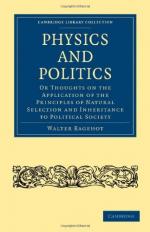Nor is this merely a vague and, at bottom, a more or less meaningless statement. For, indeed, considering this essay only, that deals with wisdom and destiny, at the root of it—its fundamental principle, its guiding, inspiring thought—is love. “Nothing is contemptible in this world save only scorn,” he says; and for the humble, the foolish, nay, even the wicked, he has the same love, almost the same admiration, as for the sage, the saint, or the hero. Everything that exists fills him with wonder, because of its existence, and of the mysterious force that is in it; and to him love and wisdom are one, “joining hands in a circle of light.” For the wisdom that holds aloof from mankind, that deems itself a thing apart, select, superior, he has scant sympathy—it has “wandered too far from the watchfires of the tribe.” But the wisdom that is human, that feeds constantly on the desires, the feelings, the hopes and the fears of man, must needs have love ever by its side; and these two, marching together, must inevitably find themselves, sooner or later, on the ways that lead to goodness. “There comes a moment in life,” he says, “when moral beauty seems more urgent, more penetrating, than intellectual beauty; when all that the mind has treasured must be bathed in the greatness of soul, lest it perish in the sandy desert, forlorn as the river that seeks in vain for the sea.” But for unnecessary self-sacrifice, renouncement, abandonment of earthly joys, and all such “parasitic virtues,” he has no commendation or approval; feeling that man was created to be happy, and that he is not wise who voluntarily discards a happiness to-day for fear lest it be taken from him on the morrow. “Let us wait till the hour of sacrifice sounds—till then, each man to his work. The hour will sound at last—let us not waste our time in seeking it on the dial of life.”
In this book, morality, conduct, life are Surveyed from every point of the compass, but from an eminence always. Austerity holds no place in his philosophy; he finds room even “for the hours that babble aloud in their wantonness.” But all those who follow him are led by smiling wisdom to the heights where happiness sits enthroned between goodness and love, where virtue rewards itself in the “silence that is the walled garden of its happiness.”
It is strange to turn from this essay to Serres Chaudes and La Princesse Maleine, M. Maeterlinck’s earliest efforts—the one a collection of vague images woven into poetical form, charming, dreamy, and almost meaningless; the other a youthful and very remarkable effort at imitation. In the plays that followed the Princesse Maleine there was the same curious, wandering sense of, and search for, a vague and mystic beauty: “That fair beauty which no eye can see, Of that sweet music which no ear can measure.” In a little poem of his, Et s’il revenait, the last words of a dying girl, forsaken by her lover, who is asked by her sister what shall be told to the faithless one, should he ever seek to know of her last hours:




